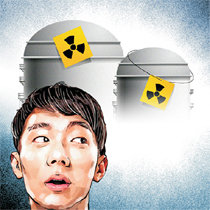Zero applicants at nuclear energy department
Zero applicants at nuclear energy department
Posted June. 28, 2018 07:28,
Updated June. 28, 2018 07:28

On May 14, 1948, North Korea unilaterally shut down electricity that was sent to South Korea from the hydro-electric power generating facility. Electric trains stopped and industrial facilities that were a few to begin with were all paralyzed. It was when the per capita income remained at a mere 67 dollars. The government had to make tremendous efforts to overcome the electric power shortage with two floating power plants including the Mokpo heavy oil power plant that was completed a year later and Electra, which was supported by the United States.
South Korea, which does not have resources, staked its all on the development of nuclear energy. That is why nuclear energy is referred to as “energy extracted from the brain.” In 1956, a nuclear energy department was established at the Ministry of Education and researchers were seconded to the Argon Research Center in the United States. Nuclear engineering department was created at Hanyang University in 1958 and at Seoul National University in 1959, making devotions in fostering experts. With the commercial operation of the first nuclear energy power plant Gori No. 1 in April 1979, South Korea became the 21st country in the world and the 4th country in Asia following Japan, India and Pakistan, to light up the “third fire.” South Korea, which was not even aware of what nuclear energy was when advanced countries conducted nuclear experiments, could become one of the four major export countries of nuclear power plants owing to the power of “brain.”
This year, no student applied to the nuclear energy and quantum engineering department at KAIST. The nuclear engineering department at Seoul National University also lacks students with just one applicant for a maximum five students doctorate course and 11 applicants at the comprehensive course for masters and doctorate degree, which can accommodate up to 37 students, when recruiting students in the latter half of 2017. The world, which has now entered the fourth industrial revolution, is focusing on nuclear energy as a stable source of energy, yet in South Korea, it is becoming a study with no future. The science and technology sector is concerned with a sense of crisis that the world-level technology and research power that have been built over the past 50 years may shake from the roots.
In South Korea, which does not have abundant crude oil or massive population like China, human and intellectual power is the most competitive resource. Nuclear energy is comprehensive science. Only 10 percent of those working in the nuclear power plant has nuclear energy related major but we need engineers who cover all areas including machine, chemistry, material, physics, control engineering and computer. We should not allow the precious resource built with difficulty be damaged by the government’s breakaway drive from nuclear energy.
Headline News
- Joint investigation headquarters asks Yoon to appear at the investigation office
- KDIC colonel: Cable ties and hoods to control NEC staff were prepared
- Results of real estate development diverged by accessibility to Gangnam
- New budget proposal reflecting Trump’s demand rejected
- Son Heung-min scores winning corner kick







